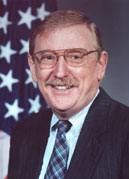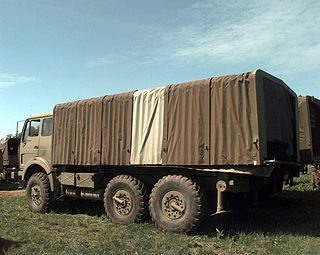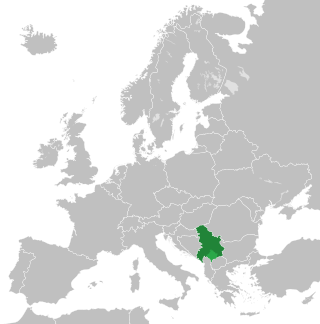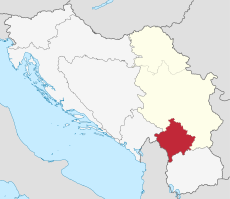
The Kosovo War was an armed conflict in Kosovo that lasted from 28 February 1998 until 11 June 1999. It was fought between the forces of the Federal Republic of Yugoslavia (FRY), which controlled Kosovo before the war, and the Kosovo Albanian separatist militia known as the Kosovo Liberation Army (KLA). The conflict ended when the North Atlantic Treaty Organization (NATO) intervened by beginning air strikes in March 1999 which resulted in Yugoslav forces withdrawing from Kosovo.

The State Union of Serbia and Montenegro or simply Serbia and Montenegro, known until 2003 as the Federal Republic of Yugoslavia and commonly referred to as FR Yugoslavia (FRY) or simply Yugoslavia, was a country in Southeast Europe located in the Balkans that existed from 1992 to 2006, following the breakup of the Socialist Federal Republic of Yugoslavia. The state was founded on 27 April 1992 as a federation comprising the Republic of Serbia and the Republic of Montenegro. In February 2003, it was transformed from a federal republic to a political union until Montenegro seceded from the union in June 2006, leading to the full independence of both Serbia and Montenegro.

The Kosovo Liberation Army was an ethnic Albanian separatist militia that sought the separation of Kosovo, the vast majority of which is inhabited by Albanians, from the Federal Republic of Yugoslavia (FRY) and Serbia during the 1990s. Albanian nationalism was a central tenet of the KLA and many in its ranks supported the creation of a Greater Albania, which would encompass all Albanians in the Balkans, stressing Albanian culture, ethnicity and nation.

William Graham Walker is a United States Foreign Service diplomat who served as the US ambassador to El Salvador and as the head of the Kosovo Verification Mission.

United Nations Security Council resolution 1244, adopted on 10 June 1999, after recalling resolutions 1160 (1998), 1199 (1998), 1203 (1998) and 1239 (1999), authorised an international civil and military presence in the Federal Republic of Yugoslavia and established the United Nations Interim Administration Mission in Kosovo (UNMIK). It followed an agreement by Yugoslav President Slobodan Milošević to terms proposed by President of Finland Martti Ahtisaari and former Prime Minister of Russia Viktor Chernomyrdin on 8 June, involving withdrawal of all Yugoslav state forces from Kosovo.

United Nations Security Council resolution 787, adopted on 16 November 1992, after reaffirming Resolution 713 (1991) and all subsequent resolutions on the topic, the council called upon the parties in Bosnia and Herzegovina to consider the draft outline constitution as a basis for negotiating a political settlement of the conflict in the country, and went on to impose further international sanctions on the Federal Republic of Yugoslavia.

United Nations Security Council resolution 855, adopted on 9 August 1993, after reaffirming resolutions at putting an end to the conflict in the former Yugoslavia and hearing representations from the Organization for Security and Co-operation in Europe (OSCE) and the Federal Republic of Yugoslavia, the council called upon Serbia and Montenegro to reconsider its refusal to allow OSCE missions in its territory.

United Nations Security Council Resolution 1021, adopted on November 22, 1995, after recalling all resolutions on the situation in the former Yugoslavia, particularly resolutions 713 (1991) and 727 (1992), the Council set a date of March 13, 1996, for the suspension of most aspects of the arms embargo on the former Yugoslavia. Resolution 1074 (1996) terminated the remaining measures of the embargo.

United Nations Security Council resolution 1186, adopted unanimously on 21 July 1998, after recalling resolutions 1105 (1997) and 1110 (1997), the Council extended and strengthened the mandate of the United Nations Preventive Deployment Force (UNPREDEP) in Macedonia until 28 February 1999.

United Nations Security Council resolution 1199, adopted on 23 September 1998, after recalling Resolution 1160 (1998), the Council demanded that the Albanian and Yugoslav parties in Kosovo end hostilities and observe a ceasefire.

United Nations Security Council resolution 1203, adopted on 24 October 1998, after recalling resolutions 1160 (1998) and 1199 (1998) on Kosovo, the Council demanded that the Federal Republic of Yugoslavia comply with previous Security Council resolutions and co-operate with the NATO and Organization for Security and Co-operation in Europe (OSCE) verification missions in Kosovo.

United Nations Security Council resolution 1239, adopted on 14 May 1999, after recalling resolutions 1160 (1998), 1199 (1998) and 1203 (1998), the Council called for access for the United Nations and other humanitarian personnel operating in Kosovo to other parts of the Federal Republic of Yugoslavia.

United Nations Security Council resolution 1298, adopted unanimously on 17 May 2000, after reaffirming resolutions 1177 (1998), 1226 (1999), 1227 (1999) and 1297 (2000) on the situation between Eritrea and Ethiopia, the Council condemned continuing hostilities and imposed an arms embargo on both countries.

United Nations Security Council resolution 1345, adopted unanimously on 21 March 2001, after reaffirming resolutions 1160 (1998), 1199 (1998), 1203 (2000), 1239 (1999) and 1244 (1999) on the situation in the former Yugoslavia, the council condemned extremist violence and terrorist activities in parts of Macedonia and southern Serbia and called upon Kosovo Albanian leaders to condemn the violence.

United Nations Security Council resolution 1367, adopted unanimously on 10 September 2001, after recalling resolutions 1160 (1998), 1199 (1998), 1203 (1998) and reaffirming resolutions 1244 (1999) and 1345 (2001) in particular, the Council terminated the arms embargo against the Federal Republic of Yugoslavia after it had satisfied Council demands to withdraw from Kosovo and allow a political dialogue to begin.

United Nations Security Council resolution 1371, adopted unanimously on 26 September 2001, after reaffirming resolutions 1244 (1999) and 1345 (2001) on the situation in the former Yugoslavia including Macedonia, the Council called for the full implementation of its Resolution 1345 concerning violence and terrorist activities in Macedonia and southern Serbia.

The OSCE Kosovo Verification Mission (KVM) was an OSCE mission to verify that the Serbian and Yugoslav forces were complying with the UNSC Resolution 1203 and the Clark-Naumann agreement, to end atrocities in Kosovo, withdraw armed forces from Kosovo, and abide by a ceasefire. The mission was deployed on 25 October 1998, withdrawn in March 1999 and was closed on 9 June 1999.

During the Yugoslav Wars of the 1990s and early 2000s, several rounds of international sanctions were imposed against the former Yugoslav republics of Serbia and Montenegro that formed a new country called the Federal Republic of Yugoslavia.

The 2000 unrest in Kosovo was the result of the United Nations Interim Administration adopting Resolution 1244 on 10 June 1999. The unrest was fought between the Kosovo Force (KFOR), Kosovar Albanians, and Kosovar Serbs. It lasted somewhere from February 16, 2000 – June 6, 2000. An unknown number of Kosovar Albanians and Kosovar Serbs died along with an unknown number injured, while 1 Russian KFOR soldier died from shot wounds and UNMIK vehicles were burned during the unrest.
Operation Eagle Eye was the result of the NATO-Kosovo Verification Mission agreement which was signed in Belgrade on 15 October 1998, under which the Federal Republic of Yugoslavia agrees to establish an air surveillance system consisting of NATO non-combatant reconnaissance aircraft and unmanned aerial vehicles.



















